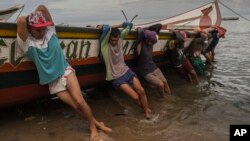The pirates had killed Flaco Marval's brother and two cousins, and word was they were coming for the rest of the family.
So the skinny 17-year-old and the other Marval men ran to grab the guns they'd soldered together from kitchen pipes, smoked an acrid-smelling drug to boost their energy, and went out into the night to patrol the sandy village streets.
"We just have to kill these thugs, and then we can go back to fishing like we always did," Flaco said.
Pirates are terrorizing the coastal state of Sucre, once home to the world's fourth-largest tuna fleet and a thriving fishing industry.
That trade has collapsed, along with virtually every industry across Venezuela. Gangs of out-of-work fishermen prey upon those who still venture out into the open sea, stealing their catch and their motors, tying them up, throwing them overboard, and sometimes shooting them. The robberies have taken place daily this year, and dozens of fishermen have died.
"People can't make a living fishing anymore, so they're using their boats for the options that are left: smuggling gas, running drugs, and piracy," said Jose Antonio Garcia, leader of the state's largest union.
The warm Caribbean sea is increasingly becoming a grim free-for-all.
Seven members of the Marval clan were preparing to return home one night in September when they heard shots.
"There's no way to run when you're stopped dead in the water, so I just started praying, `God, let them leave without hurting us,'" 42-year-old Edecio Marval said.
Instead, after stealing the boat's motor and the night's catch, the men shot dead Edecio's oldest child, who had kept the group laughing all night with cheesy jokes, and two others.
As they prepared to kill Edecio's teenage nephew, one pirate shouted for the others to stop. "No, that's my friend," he said. They had fished together until last year.
So the group sped off, leaving the surviving Marvals to send flashes of light into the darkness. They wept as the bodies of their loved ones grew cold beside them.
Back home in the village of Punta de Araya, they told police that they'd recognized the pirates' leader: It was El Beta, a 19-year-old killer with 40 men at his command who lived a half mile down the road.
El Beta began calling Flaco Marval, threatening to come back and wipe out the whole clan.
"Your brother cried like a little bitch when I killed him. Now I'm coming for all of you snitches," he said in a taunting voice message the family turned over to the police.
The Marvals hunkered down. Along with their neighbors, they gave up going to the state-run hospital up the hill because that area was controlled by El Beta. They stopped sending their kids to school. And they started nightly patrols.
"It's not safe to leave the house," said Tibisay Marval, whose son was killed.
On the night they prepared to face down El Beta, Flaco spotted a soldier darting beneath a streetlight with his Kalashnikov rifle drawn. Soon, the streets were filled with villagers hoping the coast guard had caught a group of pirates.
"Let's see if someone gets killed!" a neighbor shouted.
As the throng pushed in, soldiers loaded three men onto a cargo truck. But the villagers started to protest that they had the wrong guys; they knew those suspects to be honest fishermen. The soldiers let the men go.
Women began crowding around a lieutenant. Why hadn't he helped get their motors back? When was he going to take a stand against El Beta?
The lieutenant urged patience. But later he confessed that he too wanted to see El Beta dead. Officers have arrested one of El Beta's men for the Marval murders, but are reluctant to make mass arrests because the jails are already packed full.
"You hear piracy and you think of guys robbing container ships in Africa. But here it's just poor fishermen robbing other poor fishermen," said Sucre lawyer Luis Morales. "It's the same kind of crime we've seen in the streets, but spreading to the sea."
Shortly after the soldiers left Punta de Araya, the Marval women started getting warnings from friends in El Beta's neighborhood that 15 members of his gang were preparing to attack.
The women debated whether to call back the coast guard and risk being labeled rats. Just as they decided to make the call, the village's power and cell service went out, as if cut by a hostile force. Panicked, they went to alert Flaco and the others.
The cousins rushed to their armory of homemade handguns and rifles, hidden in a cinderblock hut with a sheet hung for a door.
Laughing at each other's coughing fits, they smoked cocaine-laced marijuana through a long glass pipe they'd fashioned out of a fluorescent light bulb. They tried to psych themselves up for battle by listening again to El Beta's threatening message, crowding around a half-broken flip phone.
"Remember how we used to take naps on the beach with money in our pockets?" one cousin said.
"This isn't going to be over until someone kills that guy," said another.
Suddenly, the dogs began to bark. The young men shot out to the street to see if the gang was on its way. They kept up their patrol for hours, pausing every once in a while to smoke from the glass pipe.
Eventually, the barking died down. The power came back on. El Beta did not show up.
The Marval women stayed awake until dawn, playing dominos near a shrine to the three slain men. Flaco's aunt Petra Marval said they worry about the cousins, but see no other option.
"Flaco could be killed here in the streets," she said. "But he could be killed out at sea, too."




